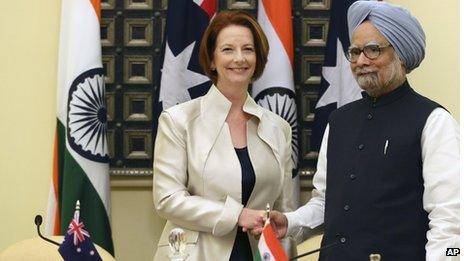India and Australia to begin nuclear talks
- Published

Ms Gillard's government overturned a ban on selling uranium to India
India and Australia have agreed to begin negotiations on a civil nuclear co-operation agreement.
The co-operation will eventually allow the sale of Australian uranium to India for its nuclear power programme.
The move came as Australian PM Julia Gillard held talks with Indian counterpart Manmohan Singh in Delhi on Wednesday.
Last December Ms Gillard's ruling Labor party overturned its long-standing ban on exporting uranium to India.
Australia, which holds an estimated 40% of the world's uranium, already exports it to China, Japan, Taiwan and the US.
The country does not sell uranium to India because it is not a signatory to the Nuclear Non-Proliferation Treaty.
"Prime Minister Manmohan Singh welcomed the decision of the Australian government on uranium sales to India, noting that nuclear energy will play an important role in India's future energy needs," said a joint statement issued after the talks between Mr Singh and Ms Gillard.
"India and Australia [will] commence negotiations on a bilateral civil nuclear co-operation agreement which, for Australia, is a prerequisite for uranium sales to other countries," it added.
Mr Singh said Australia's agreement to begin negotiations was a "recognition of India's energy needs as well as our record and credentials".
The two leaders also held talks aimed at boosting economic ties between the two countries - bilateral trade is worth $20bn (£12.5bn) and is growing at the rate of 20% every year.
- Published22 August 2012
- Published5 December 2011